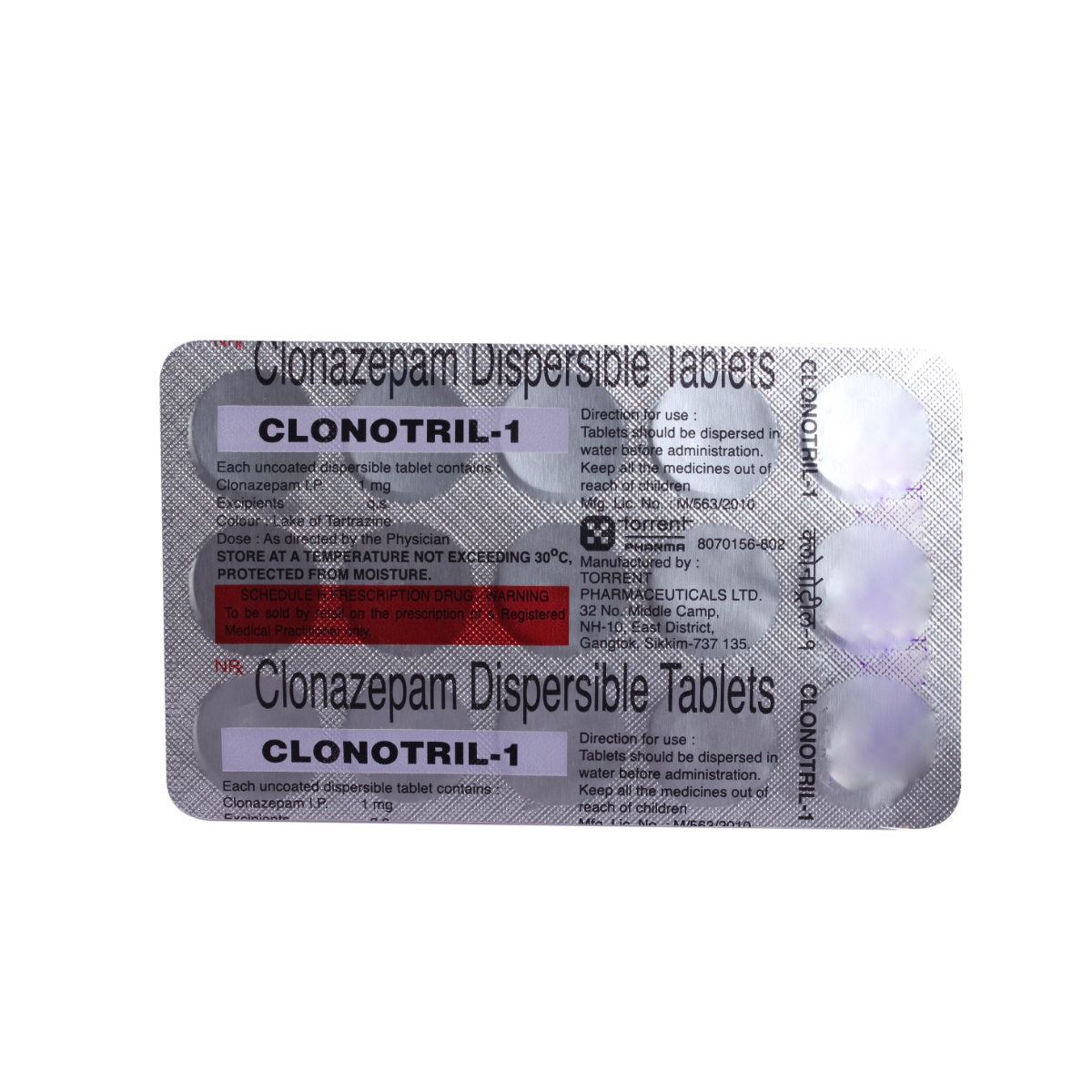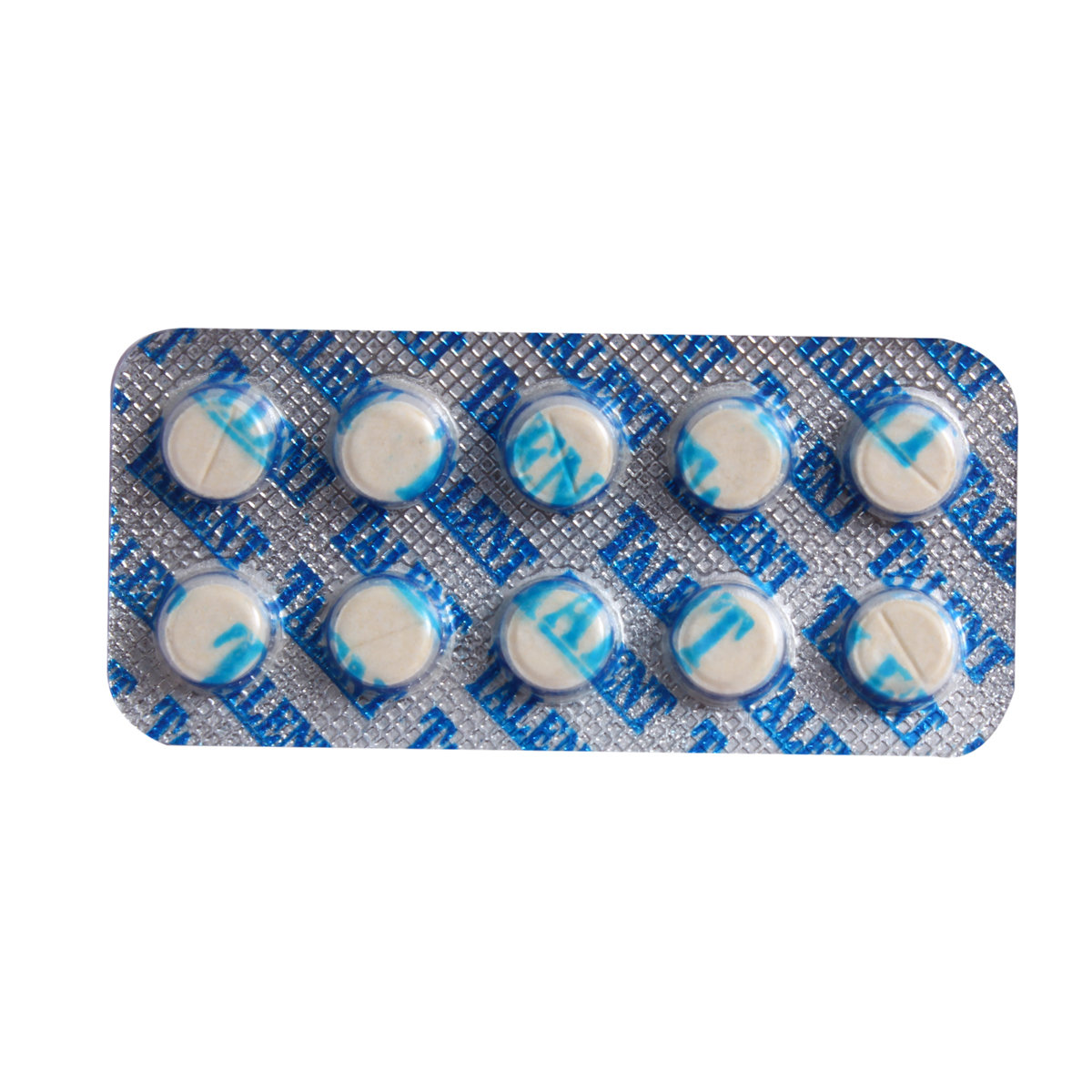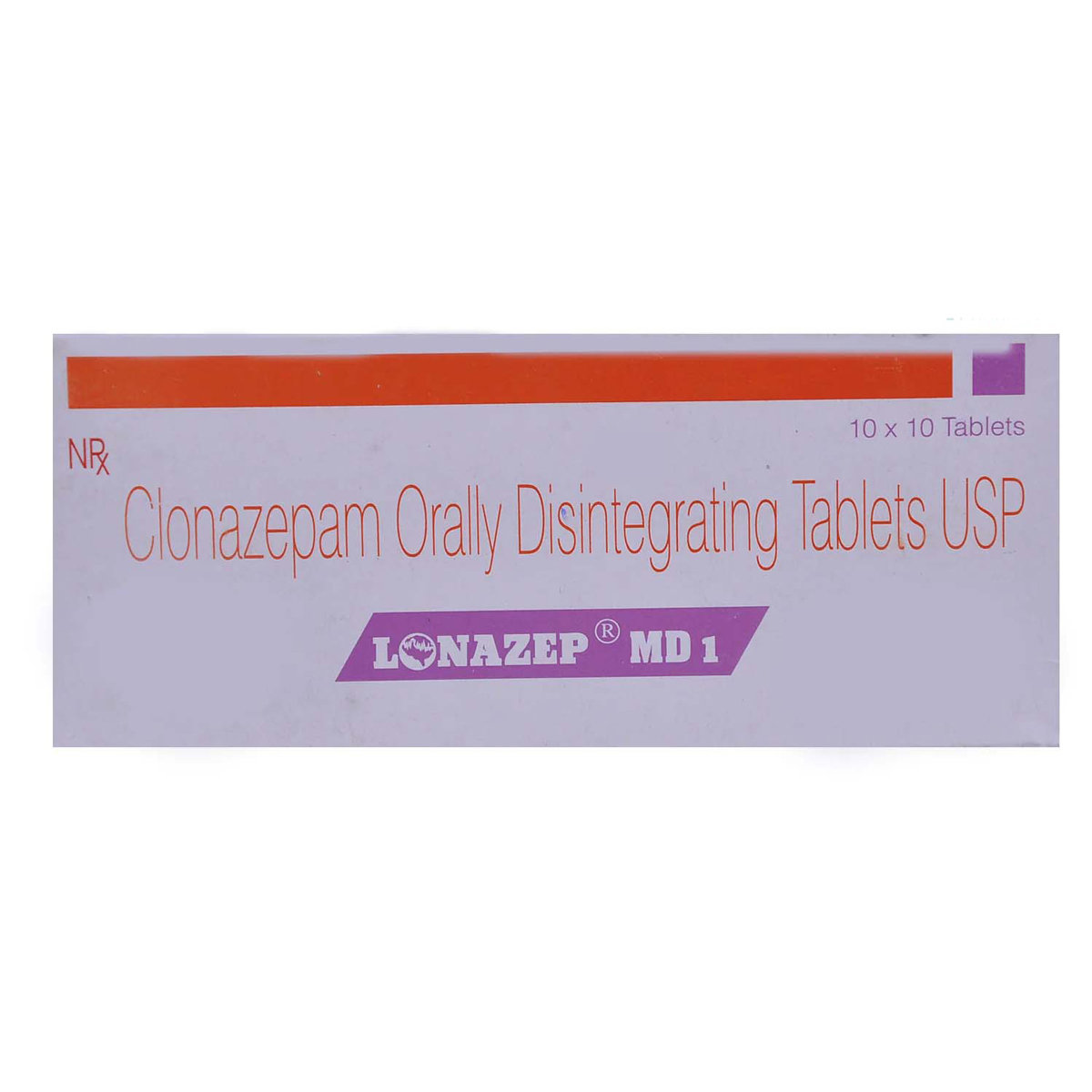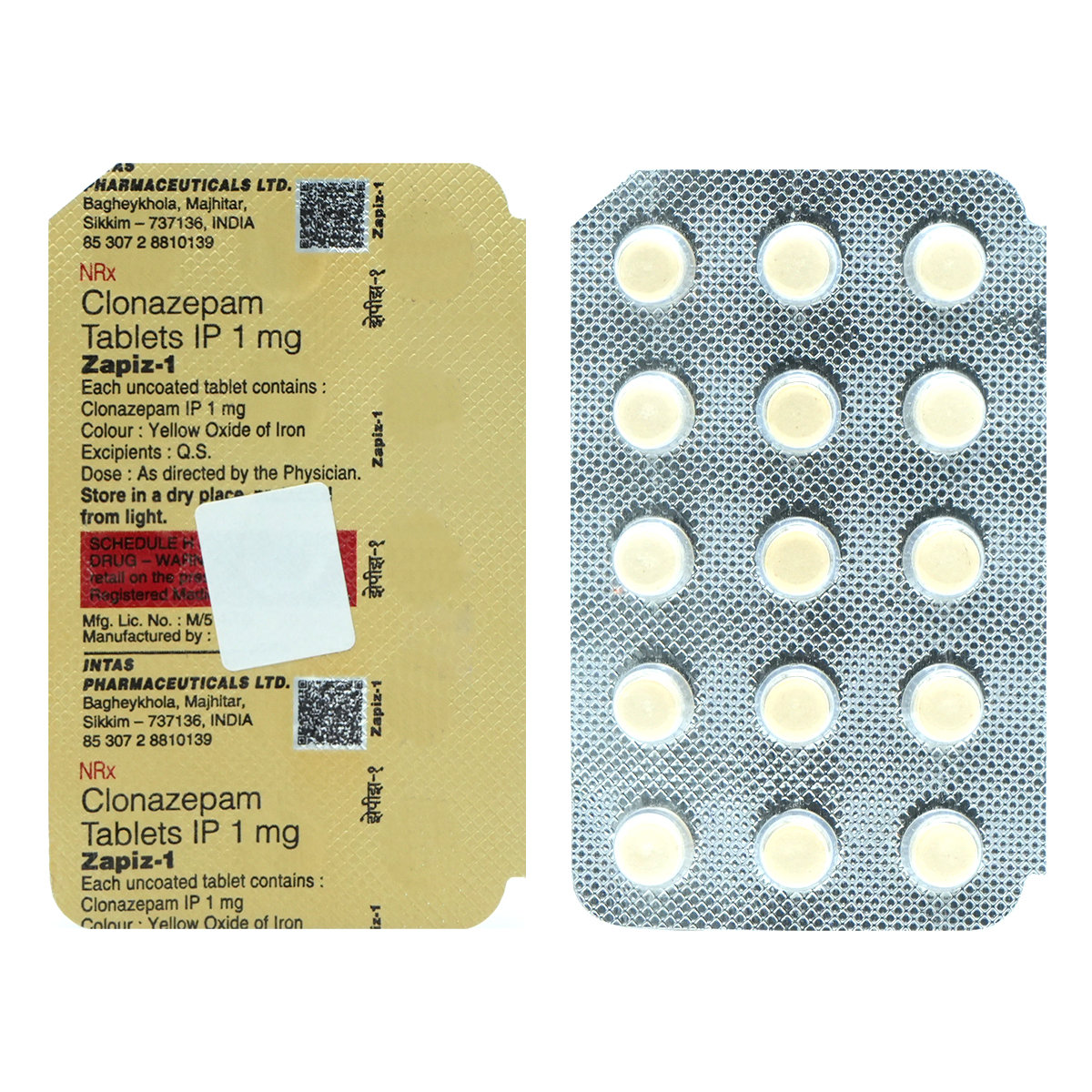- Home
- MELTAZ 1MG DT TABLET
MELTAZ 1MG DT TABLET Substitute
MELTAZ 1MG DT TABLET Substitute
Medicine Composition:
CLONAZEPAM-1MGAll Substitutes & Brand Comparisons
RX
Not for online saleLOZEP 1MG TABLET
Priya Pharmaceuticals Pvt Ltd
₹24
(₹2.16 per unit)
54% CHEAPERRX
Not for online saleClorpam 1 mg Tablet 10's
East West Pharma India Pvt Ltd
₹24.5
(₹2.21 per unit)
53% CHEAPERRX
Out of StockNot for online saleActapam-Md 1Mg Disintegrating Tab 10'S
Actawin Lifesciences Pvt Ltd
₹36
(₹3.24 per unit)
32% CHEAPERRX
Out of StockNot for online saleClotas 1 Tablet 10's
Alkem Laboratories Ltd
₹46
(₹4.14 per unit)
13% CHEAPERRX
Out of StockNot for online saleAFD-Clona 1 mg Tablet 10's
Anglo French Drugs & Industries Ltd
₹47.26
(₹4.25 per unit)
10% CHEAPERRX
Not for online saleLinotril 1 mg Tablet 10's
Linux Laboratories Pvt Ltd
₹49.5
(₹4.46 per unit)
6% CHEAPERRX
Not for online saleClonotril 1mg DT Tablet 15's
Torrent Pharmaceuticals Ltd
₹75
(₹4.5 per unit)
5% CHEAPERRX
Not for online saleClonotril 1 mg Tablet 10's
Torrent Pharmaceuticals Ltd
₹50
(₹4.5 per unit)
5% CHEAPERRX
Not for online saleCloze 1 mg Tablet 10's
Talent India Pvt Ltd
₹50
(₹4.5 per unit)
5% CHEAPERRX
Not for online saleLonazep 1 Tablet 10's
Sun Pharmaceutical Industries Ltd
₹50.5
(₹4.55 per unit)
4% CHEAPERRX
Not for online saleLonazep MD 1 Tablet 10's
Sun Pharmaceutical Industries Ltd
₹50.5
(₹4.55 per unit)
4% CHEAPERRX
Not for online saleZapiz-1 Tablet 15's
Intas Pharmaceuticals Ltd
₹76
(₹4.56 per unit)
4% CHEAPERRX
Not for online saleOna-1 Tablet 10's
D D Pharmaceuticals Pvt Ltd
₹51.5
(₹4.64 per unit)
2% CHEAPERRX
Not for online saleLonapam Md 1mg Tablet 10's
Shine Pharmaceuticals Ltd
₹54.5
(₹4.91 per unit)
2% COSTLIERRX
Not for online saleZAPIZ 1 MG TABLET 10's
Intas Pharmaceuticals Ltd
₹76
(₹6.84 per unit)
43% COSTLIER

When Should You Consider Switching from MELTAZ 1MG DT TABLET ?
Patients may explore substitutes in the following scenarios:
- High monthly cost of MELTAZ 1MG DT TABLET
- Non-availability in local pharmacies
- Generic recommendation by a doctor
- Side effects or better tolerability with alternatives
What to Know Before Switching
Before you switch from MELTAZ 1MG DT TABLET to another medicine, here are some important points to keep in mind:
Same salt, different brands:
Most substitutes contain the same active ingredient - CLONAZEPAM-1MG, but the fillers, coating, or manufacturing quality may vary slightly.
Consult your doctor first:
Even if the salt is the same, your doctor can confirm if the substitute is right for your condition, dosage, and health history.
Watch out for allergies or reactions:
Some people may react differently to certain brands due to inactive ingredients. If you notice any side effects, inform your doctor immediately.
Price ≠ effectiveness:
A lower-priced substitute doesn't mean it's less effective. Many generic medicines work just as well as branded ones.
Check the dosage form and strength:
Always match the substitute’s strength (e.g., 5mg, 10mg) and form (tablet, capsule, syrup) with what your doctor prescribed.
Uses
MELTAZ 1MG DT TABLET is used in the treatment of seizures, panic disorder, involuntary muscle spasms and restless leg syndrome. The detailed uses of MELTAZ 1MG DT TABLET are as follows:
- Management of Anxiety Disorders: MELTAZ 1MG DT TABLET is often prescribed to ease symptoms of anxiety disorders, providing relief from excessive worry and emotional tension.
- Treatment of Panic Disorders: MELTAZ 1MG DT TABLET helps manage panic disorder by reducing the severity and frequency of panic attacks in affected individuals.
- Insomnia Treatment: MELTAZ 1MG DT TABLET can improve sleep quality by inducing sedation, offering relief for those suffering from insomnia or other sleep disturbances.
- Muscle Relaxation: MELTAZ 1MG DT TABLET is used for its muscle relaxant properties, effectively relieving physical discomfort and tension caused by muscle spasms.
Medicinal Benefits
MELTAZ 1MG DT TABLET belongs to the group of medications called benzodiazepines, primarily used to treat seizures or fits due to epilepsy, panic disorder and involuntary muscle spasms. MELTAZ 1MG DT TABLET may also be used to treat restless leg syndrome. MELTAZ 1MG DT TABLET contains clonazepam, which works by increasing the level of a calming chemical known as gamma-aminobutyric acid (GABA) in the brain. It decreases the feeling of nervousness, stress, and anxiety, which leads to a state of calmness and relaxation. MELTAZ 1MG DT TABLET benefits people who struggle with anxiety and worries in daily life. Regular intake of the prescribed dose of MELTAZ 1MG DT TABLET improves social life, the ability, performance at work and general well-being.
FAQs
The substitutes of MELTAZ 1MG DT TABLET contain the same active salt(s) - CLONAZEPAM-1MG. However, they may differ in price, manufacturing quality, and inactive ingredients. Speak to your doctor to find a suitable option.
Switching to a generic substitute medicine in the place of MELTAZ 1MG DT TABLET is often possible if it has the same salt, strength, and dosage form. But always check with your doctor before making any changes to your medication.
Generics versions of MELTAZ 1MG DT TABLET are typically more affordable because they don’t include the original brand's research, development, and marketing costs. They contain the same active ingredient and are approved for safety and effectiveness.
Most people don’t notice any difference. However, some may react to different fillers or coatings. If you notice any unusual symptoms after switching, consult your doctor.
Make sure the new medicine has the same active salt, strength, dosage form. Always confirm the change with your doctor or pharmacist.
Substitutes of MELTAZ 1MG DT TABLET meet the same safety and efficacy standards as MELTAZ 1MG DT TABLET , but small differences in absorption or formulation can exist. A doctor can help you choose the right one for your needs.
Yes. Substitutes of MELTAZ 1MG DT TABLET may vary in color, size, or shape due to differences in manufacturing and branding, but this does not affect how they work.
Yes, it’s generally safe to switch between multiple substitutes of MELTAZ 1MG DT TABLET if they have the same salt and strength. However, always inform your doctor so they can monitor how your body responds.
Yes, many people safely use substitutes of MELTAZ 1MG DT TABLET for long-term treatment. Just ensure it’s done under medical supervision.
If your symptoms stay under control or lab results remain stable, the substitute for MELTAZ 1MG DT TABLET is likely working well. Regular follow-ups with your doctor are important.
Absolutely. Even with the same salt, small differences can affect how your body responds when switching from MELTAZ 1MG DT TABLET to its substitute. Always consult your doctor before switching.
MELTAZ 1MG DT TABLET is used to treat seizures or fits due to epilepsy, panic disorder and involuntary muscle spasms. It may also be used to treat restless leg syndrome.
MELTAZ 1MG DT TABLET boosts gamma-aminobutyric acid levels (GABA) in the brain, which helps to ease anxiety, stop seizures (fits), and relax tense muscles.
MELTAZ 1MG DT TABLET is a controlled and habit-forming drug. It is not likely to be addictive if you take it for 2-4 weeks. However, if MELTAZ 1MG DT TABLET is prescribed for more than 2-4 weeks, your doctor may reduce your dose gradually before completely stopping it to avoid withdrawal symptoms.
Elderly patients (aged more than 65 years) are more likely to have confusion and sleepiness, or age-related health issues, which may require caution and an adjustment in the dose. Consult a doctor if you have any concerns.
Do not stop taking MELTAZ 1MG DT TABLET until instructed by your doctor. Stopping MELTAZ 1MG DT TABLET may cause withdrawal symptoms like seizures that do not stop, hallucinations (hearing or seeing things that are not there), shaking, and stomach and muscle cramps. Your doctor may lower the dose gradually to prevent this.
Caffeine is a stimulant that may reduce the calming effects of MELTAZ 1MG DT TABLET . So, it is advisable to avoid consuming caffeinated beverages like coffee, tea, cola, or chocolate containing caffeine.
Yes, MELTAZ 1MG DT TABLET acts on nerve cells to help calm abnormal electrical activity in the brain, which may help reduce feelings of anxiety. However, MELTAZ 1MG DT TABLET should only be taken for anxiety if prescribed by your doctor.
Yes, MELTAZ 1MG DT TABLET can make you sleepy because it is a benzodiazepine with sedative effects. It may cause drowsiness as a common side effect. If you continue to feel drowsy for a long time, please inform your doctor.
No, MELTAZ 1MG DT TABLET is generally recommended for short-term use due to its potential for dependence and side effects. Please consult your doctor regularly to assess the need for continued use.
The common side effects of MELTAZ 1MG DT TABLET include drowsiness, dizziness, fatigue, and problems with memory, walking, and coordination. If these side effects persist, please inform your doctor.
Buy best C.n.s Drugs products by
Intas Pharmaceuticals Ltd
Sun Pharmaceutical Industries Ltd
Torrent Pharmaceuticals Ltd
Alkem Laboratories Ltd
Alteus Biogenics Pvt Ltd
Abbott India Ltd
Cipla Ltd
Micro Labs Ltd
Lupin Ltd
Tripada Healthcare Pvt Ltd
D D Pharmaceuticals Pvt Ltd
Ipca Laboratories Ltd
Arinna Lifesciences Ltd
Icon Life Sciences
Linux Laboratories Pvt Ltd
Mankind Pharma Pvt Ltd
Cnx Health Care Pvt Ltd
East West Pharma India Pvt Ltd
La Renon Healthcare Pvt Ltd
Emcure Pharmaceuticals Ltd
Eris Life Sciences Ltd
Leeford Healthcare Ltd
Talent India Pvt Ltd
Consern Pharma Ltd
Tas Med India Pvt Ltd
Macleods Pharmaceuticals Ltd
Zydus Healthcare Ltd
Jagsam Pharma
Troikaa Pharmaceuticals Ltd
Dr Reddy's Laboratories Ltd
Ikon Pharmaceuticals Pvt Ltd
Matias Healthcare Pvt Ltd
Sigmund Promedica
Aristo Pharmaceuticals Pvt Ltd
Ardent Life Sciences Pvt Ltd
Shine Pharmaceuticals Ltd
Zydus Cadila
Theo Pharma Pvt Ltd
Wockhardt Ltd
Propel Healthcare
Lifecare Neuro Products Ltd
Crescent Formulations Pvt Ltd
Mesmer Pharmaceuticals
Matteo Health Care Pvt Ltd
Reliance Formulation Pvt Ltd
Morepen Laboratories Ltd
Ajanta Pharma Ltd
Capital Pharma
Neon Laboratories Ltd
Med Manor Organics Pvt Ltd
Akumentis Healthcare Ltd
Lyf Healthcare
Msn Laboratories Pvt Ltd
Sanix Formulation Pvt Ltd
Pulse Pharmaceuticals
Brainwave Healthcare Pvt Ltd
Hetero Healthcare Pvt Ltd
Cyrus Remedies Pvt Ltd
Sanofi India Ltd
Solvate Laboratories Pvt Ltd
Elder Pharmaceuticals Ltd
Novartis India Ltd
Psyco Remedies Ltd
Medishri Healthcare Pvt Ltd
Quince Lifesciences Pvt Ltd
Alniche Life Sciences Pvt Ltd
Crescent Therapeutics Ltd
Hbc Life Sciences Pvt Ltd
Mova Pharmaceutical Pvt Ltd
Prevego Healthcare & Research Pvt Ltd
Cadila Healthcare Ltd
Tripada Lifecare Pvt Ltd
Alembic Pharmaceuticals Ltd
Solis Pharmaceuticals
Talin Remedies Pvt Ltd
Kivi Labs Ltd
Serotonin Pharmaceuticals Llp
Glenmark Pharmaceuticals Ltd
Infivis Life Care
Aareen Healthcare Pvt Ltd
Trion Pharma India Llp
A N Pharmacia Laboratories Pvt Ltd
Gagnant Healthcare Pvt Ltd
Primus Remedies Pvt Ltd
Crescent Pharmaceuticals
Glarizonto Pharma Pvt Ltd
Knoll Healthcare Pvt Ltd
Lyceum Life Sciences Pvt Ltd
Wallace Pharmaceuticals Pvt Ltd
Zuventus Healthcare Ltd
Arches Pharmaceuticals
Cadila Pharmaceuticals Ltd
Divine Savior Pvt Ltd
Lia Life Sciences Pvt Ltd
Lincoln Pharmaceuticals Ltd
USV Pvt Ltd
Vasu Organics Pvt Ltd
Corona Remedies Pvt Ltd
Glial Life Science Llp
Maneesh Pharmaceuticals Ltd










